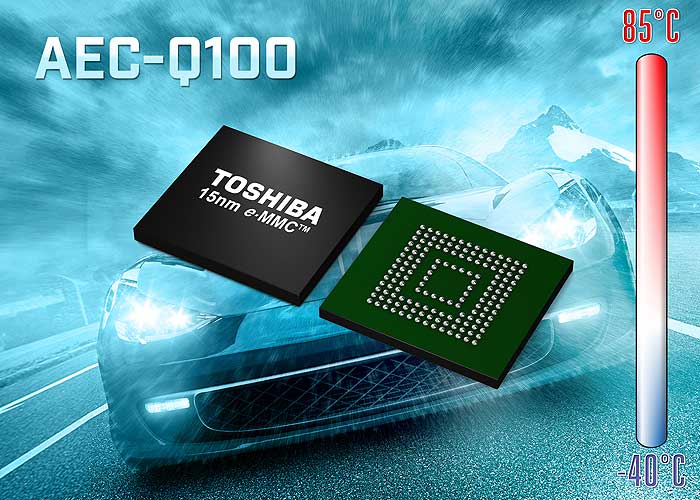 Toshiba Electronics Europe (TEE) has launched a new range of 15nm e・MMCTM [1] NAND Flash memory for automotive infotainment systems as well as industrial applications. The automotive e・MMC supports a wide operating temperature range of -40oC to 85oC and meets AEC-Q100 specifications as well as adhering to PPAP requirements.
Toshiba Electronics Europe (TEE) has launched a new range of 15nm e・MMCTM [1] NAND Flash memory for automotive infotainment systems as well as industrial applications. The automotive e・MMC supports a wide operating temperature range of -40oC to 85oC and meets AEC-Q100 specifications as well as adhering to PPAP requirements.
Toshiba’s 15nm e・MMC chips are among the world’s smallest [2] and are available in an 11.5mm x 13mm package that is fully compliant with the latest JEDEC e・MMC standard.
The new line-up of single-package embedded NAND flash memories is extremely well-suited to the demanding requirements of the automotive infotainment market, and includes densities from 8 gigabyte [3] (GB) to 64GB. Each device integrates a controller to manage basic control functions for NAND applications.
According to industry analyst firm Gartner, the majority of vehicles will be connected to the internet within five years, with 60 percent to 75 percent of them being capable of consuming, creating and sharing web-based data[4]. From maps and weather conditions to voice recognition, entertainment, driver assist features and more – cars are quickly becoming much more than just modes of transportation. Accelerated processing power and increased data storage capacity are crucial to enabling all of this connectivity, and Toshiba’s e・MMC NAND Flash memory has emerged as the data storage technology of choice for automotive applications.
Toshiba’s 15nm e・MMC offers fast read/write performance due to improvements in basic chip performance and controller optimization [5].
Notes:
[1] e・MMC is a product category for a class of embedded memory products built to the JEDEC e・MMC Standard specification and is a trademark of the JEDEC Solid State Technology Association.
[2] As of December 29, 2015. Toshiba survey.
[3] Product density is identified based on the density of memory chip(s) within the Product, not the amount of memory capacity available for data storage by the end user. Consumer-usable capacity will be less due to overhead data areas, formatting, bad blocks, and other constraints, and may also vary based on the host device and application. For details, please refer to applicable product specifications
[4] From Gartner report: “Predicts 2015: Internet of Things”
[5] Maximum read and write speed may vary depending on the host device, read and write conditions, and file size. For purposes of measuring read and write speed in this context, 1 megabyte or MB = 1,000,000 bytes.
Toshiba Electronics Europe
www.toshiba.semicon-storage.com


